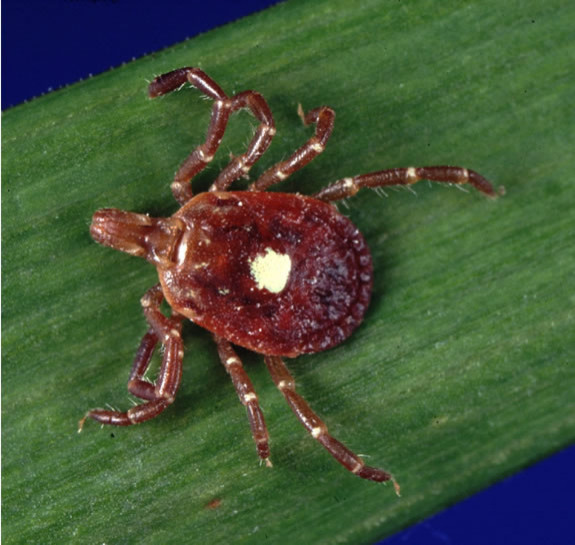Lone Star Tick's Bite Could Make You An Unwilling Vegetarian

Athough the states in the U.S. South are home to some of the best barbeque in America, they're also home to a bug that can induce meat allergies that turn carnivores into unwilling vegetarians.
The lone star tick, or Amblyomma americanum, is found from Texas to Maine, identifiable by the white spot on its back. Its saliva has been linked to what's called a meat-induced alpha-gal allergic reaction. Somehow, the tick's bite induces a person's body to produce antibodies that target alpha-gal, a carbohydrate found in red meat. Once the antibodies latch onto alpha-gal, they induce a chemical chain reaction that releases histamines and other inflammatory proteins that spark the symptoms of an allergic reaction.
Alpha-gal meat allergies are unique amongt food allergies in that symptoms can be delayed for up to six hours after a person eats the offending meat.
The link between the lone star tick and alpha-gal allergies was first described in a May 2011 paper in the Journal of Allergy and Clinical Immunology. In that study, researchers examined three people with tick bites and found that the amount of antibodies relative to alpha-gal in their bodies had increased by twenty-fold or greater.
“Blood levels of antibodies for alpha-gal in the human body can rise after a single bite from the lone-star tick,” allergist Stanley Fineman said in a statement Friday. “This can result in allergic symptoms which are usually delayed after meat ingestion and may present as mild hives but may also be a severe, potentially deadly reaction known as anaphylaxis.”
Fineman presented a study at the annual meeting of the American College of Allergy, Asthma and Immunology. It found that alpha-gal sensitivity is 32 percent higher in populations exposed to lone star ticks than people who live in other areas.
But interestingly enough, Fineman and his colleagues also found higher-than-expected rates of alpha-gal sensitization in the Western and north-central regions of the U.S., outside of the lone star tick's known habitat.
“These findings suggest that other species of ticks, or possibly human factors, may play a role in allergic reactions to alpha-gal,” said Dr. Fineman. “Patients with delayed allergic reactions after eating meats should see an allergist to determine if it is an alpha-gal allergy. The best treatment is strict avoidance of meat. An allergist may also prescribe epinephrine in the event of a life threatening emergency.”
The link between the lone star tick and induced vegetarianism is still not quite clear, but for those who live within the danger zone, avoiding tick bites is a smart move if you want to keep eating steaks, hamburgers and chops. If you're heading out on a hike, use insect repellants with DEET, wear long pants tucked into your socks and check yourself in all the hard-to-reach places -- including in your hair and under your arms -- when you get back indoors.
© Copyright IBTimes 2024. All rights reserved.




















